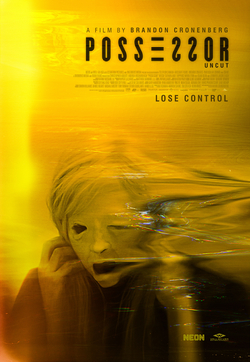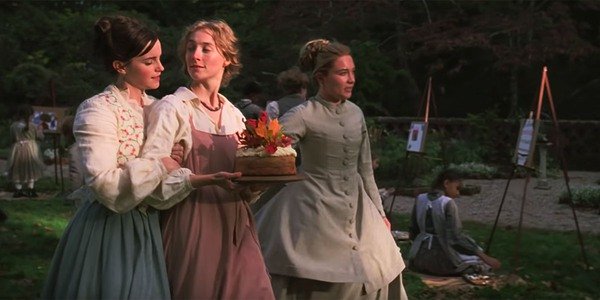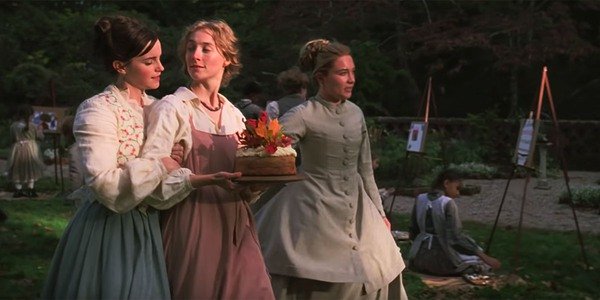 Marriage Story (2019)
Marriage Story (2019)
Written and Directed by Noah Baumbach
Starring Alan Alda, Laura Dern, Adam Driver, Julie Hagerty, Scarlett Johansson, Ray Liotta, Wallace Shawn, and Merritt Wever
A Heyday Films, Netflix release
(All Marriage Story images courtesy Netflix/Wilson Webb)
To paraphrase Victor La Valle’s The Ballad of Black Tom, “To Noah Baumbach, with all my conflicted feelings.”
A special thanks to Brian Eggert’s Deep Focus Review. His look at Marriage Story was one of my first “discoveries” as I began this odyssey. His generous assistance regarding both grammar basics (still working on it!), and making sure my bile didn’t overwhelm any good points I was trying to make, have been invaluable. Thank You.
Where did my antipathy towards Marriage Story begin?
More importantly, Why?
Why did I dislike this praised-to-the-skies awards season favorite before I even watched it?
I blame the Marriage Story one-sheet. A sepia-toned portrait of a family’s happier days. Mother, Father, and Child. Smiling, golden, content. I’d see that image before; in 1979, advertising a movie that came out between my parents’ first and second divorce filings.
Kramer vs. Kramer (1979, Columbia Pictures) made $107 million in worldwide box office and won five Oscars, including Best Picture, Actor (Dustin Hoffman) Supporting Actress (Meryl Streep), Director, and Adapted Screenplay (both Robert Benton). For my GenX cohorts, Kramer became, by virtue of its popularity and acclaim, the go-to example of a Heartwarming Divorce Drama About The Way We Live Now.
Thousands of moviegoers go to see a film like Kramer or MS. By such exposure, it gains international recognition and viewership and achieves, through that reach, status as a broadly seen and appreciated artistic statement. No matter how specific the focus, or particular the story to a location or economic class, both films become, to some extent, an example, a shared experience about a process that touches thousands of families. Even if we don’t work as advertising executives in Manhattan (like Ted Kramer) or have never won a Macarthur Foundation “Genius” Grant (like Charlie Barber in MS), the emotional journeys of these characters hopefully strike a universal chord with viewers, whatever their situation in life.
For Gen X divorce kids, the whole divorce experience is totemic, as if it’s not just the worst thing that ever happened to you, but the only thing. Susan Gregory Thomas captured it perfectly in “The Divorce Generation” (Wall Street Journal, July 9, 2011) “For much of my generation – Generation X, born between 1965 and 1980 – there is only one question: “When did your parents get divorced?” Our lives have been framed by the answer. Ask us. We remember everything.”
When I told my younger brother I was heading to the courthouse to read our parent’s 1982-83 divorce file, he reacted with one word – “Why?” Maybe that’s the question. Why do I keep digging through this carcass? Will I finally find something to help me understand? Maybe I keep digging because every decision I’ve ever made has been in reaction to it. The course of my life has been shaped by it.
Fairly or not, in my mind, our parents were careless drivers who wrecked a car, then left their children stranded by the wreck as they drove off in their shiny new lives.


I’m not angry that the unhappy family in Marriage Story doesn’t more closely resemble my unhappy family (yes, I know, we’re each unhappy in our own way), but frustrated. For all the critical hosannas to MS’s realism and rawness, it comes nowhere near the particular realities my brother and I experienced before, during, and decades after our parent’s “high-conflict” divorce. One aricle I read described the process of a high-conflict divorce as one where “a marriage ends and the war begins” For us, the post-divorce landscape just moved the battle lines we’d lived with all our lives. The marriage ended but the war continued.
I felt like I was living in a nightmare, and the language of Nightmare Cinema spoke my truth. I found, and still find, catharsis in the horror genre. In reading novels in which a panicked father deals with losing custody of his daughter while investigating a mysterious filmmaker whose movies drive people insane (Night Film by Marisha Pessl), in movies where a father and daughter repair their fractured post-divorce relationship while fighting off a swarm of VERY hungry alligators (Crawl, 2019) or a husband and wife mourn the death of their baby as they battle Lovecraftian Eldritch horrors (The Void, 2016).
My reaction to Kramer? David Cronenberg says it best. In Cronenberg on Cronenberg (1992, ed. By Chris Rodley), the Canadian director describes making his 1979 movie The Brood as a reaction to both his own divorce and Kramer. “I was really trying to get to the reality, with a capital R, which is why I have disdain for Kramer. I think its false, fake, candy. There are unbelievable, ridiculous moments in it that, to me, are emotionally completely false, if you’ve ever gone through anything like that.”
The Spring 1981 issue of Cinefantastique described The Brood’s birth pangs as follows. “Cronenberg wrote The Brood over a period of years, a tortuous time for him involving divorce from his first wife and a custody battle for his young daughter.” In the last of The Brood’s six on-screen murders, Frank Carveth (played by Art Hindle) kills his estranged wife, Nola (Samantha Eggar) to save their daughter from the murderous mutant dwarfs born of Nola’s rage. As Cronenberg told CFQ, “I can’t tell you how satisfying that scene is. I wanted to strangle my ex-wife.”

The Kramer v Kramer-ish image of Charlie, Nicole, and Henry Barber wrapped up in each other, lit in a hazy golden glow, may have set me off, but then came the cast and crew interviews, the articles and film festival statements designed to gin up awards season buzz. The Hollywood Reporter article, “Making of ‘Marriage Story’: How Noah Baumbach Crafted His “Love Story About Divorce,” particularly annoyed me. Baumbach’s Director’s Statement for the 2019 Venice Biennale made me grind my teeth. “I wanted to find the love story in the breakdown. Hope in the middle of courts and documents and rules. Movies are an antidote to divorce. A world not of division but of love.”
Is it wrong writer/director Noah Baumbach to use his life experience to craft a movie as an antidote to reality? No, but for me, this approach turned MS into a portrait of divorce so opposed to my life history that it became a wish-fulfillment fairy tale. If your own experience of divorce is more akin to a scorched earth campaign a “love story about divorce” just rings false.
Throughout MS, I envied Henry Barber (Azhy Robertson), the pampered only child of theatrical director Charlie (Adam Driver) and actress Nicole (Scarlett Johansson). If it were possible, I would’ve taken Henry’s bi-coastal life in a New York minute. Peacefully shuttling between Mom’s House and Dad’s efficiency apartment? Heavenly.
Despite my personal views, MS sits currently holds a 95% “Fresh” critic rating from critics at Rotten Tomatoes (with an 84% audience score) and holds steady at 93 on Metacritic. Despite the opacity of Netflix’s business model for measuring success, MS has been Hoovering up awards, especially for Adam Driver as Charlie. Johansson’s turn as actress Nicole may have netted her fewer awards, but she’s still collecting nominations a-plenty, including an Oscar nomination for Best Actress to go with Driver’s Best Actor nomination.
Well, how about all those critical plaudits? Alas, those critical raves set me up for disappointment to go along with my annoyance. Graham’s Detroit Daily News review hails MS as “a film that combines the humor and pain of his (Baumbach’s) previous works, with a deeply personal touch that feels raw and uncut. … it’s the best movie of the year,” and the Big Fight Scene ™ is “… the most jarring, emotionally charged scene in any film this year. It’s a stunner, unfolding with the intimacy of a stage play and hitting like a bitter gust of winter wind.”
According to Matt Thrift at Little White Lies, “It’s a film of devastating cumulative power, even-handed and empathetic in its approach to two characters whose relationship has broken down, but who still want the best for their child and each other.”
Even with an awards-bait advertising campaign modeled on a movie I loathe, these reviews indicated I’d find in MS less of a Hallmark Channel Story and more of a gritty, honest take at the worst experience of my life.
How could I criticize a movie for its poster, without watching it?
So I set aside an afternoon, grabbed a notebook, and watched Marriage Story.

CHARLIE, NICOLE AND THEIR WORLD
During MS’s Climactic Big Court Scene (more on that later), Charlie’s high-priced attorney Jay Marotta (Ray Liotta) utters a line to opposing counsel Nora Fanshaw (Laura Dern) that encapsulates my reaction to MS as a whole. “Your account of this marriage takes place in an alternate reality.” Or, at least for me, a reality not shared by 99.9% of the spouses and children experiencing divorce. Who work 9-5 jobs with little flexibility, who aren’t protected, like Charlie and Nicole, by extraordinarily privileged lives shielding them from the worst consequences of their actions. A small, hermetically sealed world in where hearing the phrase “Winning your first Tony at age 27” at an after-work social gathering is a normal part of the conversation.
Matthew Dougherty’s IGN review identified the central dilemma in MS that prevented me from identifying with Charlie and Nicole, their son, or their trauma. “Marriage Story is a film desperate to be ordinary in its portrait of a difficult divorce, and it succeeds very often. But Charlie and Nicole are immediately established as extraordinary people.” The magazine covers bearing their likenesses, the babysitter who gushes, “You’re both so good looking”, Charlie dipping into his Genius grant money to pay Jay Marotta’s $25,000 retainer – all mark this family’s belonging in a rarefied stratum of society. Charlie and Nicole often seem blind to the realities of their situation because they can afford to be.
Watching a couple who inhabit a world so far removed from anything in my life that it may as well take place in another solar system was a bridge too far for me to suspend my disbelief over. At one point in MS, Charlie prepares dinner in his (serviceable, if sparsely furnished) LA apartment. Henry asks, “Why can’t you be here more?” Charlie responds, “I have to work. You know my play’s opening on Broadway.” A sentence you will never hear from 99.9 of non-custodial dads in America. I’m still wondering if I was supposed to find this line funny, instead of unbelievable.
Throughout MS, I appreciated the movie’s quality and craftsmanship, but I could not connect with its heart.
LEGAL FIREWORKS AND COURTROOM DRAMA
For all its fireworks, the essential point of The Big Court Scene illustrated a bit of high-priced legal theater, designed to settle scores instead of revealing ultimate truths, reminded me of an exchange between attorneys Jan Schlichtmann (John Travolta) and Jerome Facher (Robert Duvall) in A Civil Action (1998). After their case goes to the jury, Facher and Schlichtmann talk outside the courtroom.
Facher: What’s your take?
Jan Schlichtmann: They’ll see the truth.
Jerome Facher: The truth? I thought we were talking about a court of law. Come on; you’ve been around long enough to know that a courtroom isn’t a place to look for the truth.
As with most of the bad decisions made by Charlie and Nicole in their legal battle, Baumbach seems to shift the blame to the attorneys, with Charlie and Nicole roped along as hapless bystanders. According to Baumach’s Venice “Directors Statement”, “The legal system of divorce is set up to divide, necessarily. It divides people, family, property and time. It keeps everyone in their own narratives and obfuscates the other person’s point of view.” But in his desire to present Charlie and Nicole as sympathetic protagonists, I felt that Baumbach strips them of both agency as human beings and diminishes their personal responsibility for their choices.
The Court Fight Scene allows Charlie and Nicole’s high-priced attorneys a chance to chew up a lot of scenery, and the presiding judge a perceptive meta-comment regarding their grandstanding. Motioning to the people waiting for their cases to be heard, the judge remarks, “There are people who don’t have the resources your clients have.” It’s a brief nod to the reality lived by the crowd waiting behind our stars for their turn, couples who aren’t as privileged as Charlie and Nicole. I appreciated this comment; my parents were probably one of those couples in the back of the courtroom.
Of the three attorneys in MS, Alan Alda’s Bert Spitz is the only character I felt portrayed a family law attorney’s job in a compassionate, realistic way. While Dern’s Nora flatters and butters up her client and Liotta’s Jay Marotta veers into cartoony combativeness, Bert, in his modest, seemingly absentminded way, gets to the truth of a family attorney’s job: making the best of a bad situation.
ON TO THE BIG FIGHT SCENE!
For a scene that is supposed to lay bare the most buried unspoken truths about Charlie and Nicole’s life together, the Big Fight Scene, following the Big Court Fight ,features quite a lot of Telling that either contradicts what previously Seen in MS or refers to things we haven’t seen. For example, we learn next to nothing about Charlie’s family, we never see or hear from his parents;,we don’t know if he has any siblings. As a result, Nicole’s accusation that Charlie is “just like his father” meant nothing to me. We’re supposed to take her word for it.
Later, Nicole yells at Charlie, “You put me through hell during our marriage.” Hold on; when do we see anyone put anyone through hell in Marriage Story? By the standards of marital hell I witnessed we don’t. Marriage Story’s beginning depicts an ostensibly loving, involved family going about their daily lives. After their separation, Charlie and Nicole’s relationship becomes clipped and distant. But we see nothing that in any way resembles “hell.” Marriage Story is one of the most civil divorces I’ve ever seen on screen.
Another reason the Big Fight Scene felt like no big deal for me? My brother and I were eyes and ear witness to years of similar blow-ups. We were either in the same room, could hear it from whatever room we were hiding in, or pretendeding to play in the backyard while ignoring the muffled roaring from inside the house. I even got to try and play Marriage Counselor once; I sat Mom and Dad on the couch to explain why they were angry at each other. It didn’t work.
If this scene to be relatively mild as verbal blow-ups go, it is to Charlie and Nicole’s credit that it occurs outside of Henry’s presence. If their child doesn’t have to see or hear it, I could care less about what these two adults shriek at each other.

Finally, I must address the Letter Scene. At Marriage Story’s end, Charlie moves to Los Angeles, accepts a teaching position, and accepts his reduced role in Henry’s life. Nicole is now a director-actress and appears much happier with her new boyfriend. Throughout the movie, Henry’s needed help with his reading homework; now this theme helps deliver a heartwarming conclusion to this domestic drama. A letter Nicole wrote for the separation mediation at the movie’s beginning, ( we hear her narrating over the heartwarming family scenes mentioned earlier, but which she refused to read to Charlie at the counseling session), has traveled with her and Henry to California. Henry somehow finds it in time to ask Charlie to help him read it aloud as Nicole happens to overhear. Hearts are warmed, tears are shed, and narrative threads knit themselves together for a bittersweet movie ending.
But for me, watching this scene showed the distance between these characters’ reality and the reality I knew, a yawning gap that kept me from identifying with their particular situation, a chasm preventing me from just accepting that this setup is their reality and I should just stop bitching about it.
Like Henry, I also found a letter written by my mom about my dad. Except she wrote it to five-year-old me in 1973, two years before my dad first served her with divorce papers. Like Nicole, my mom bared her heart. “I want you also to know that I love your father even though I fight with him. I do love him, and he loves us. Ann, I never really had a father; you do, so please always love him.”
But unlike MS’s feel-good, provide a sense of closure ending, this letter didn’t help draw my family together. Like Nicole, my mom refused to read these words aloud when they would’ve done some good. I found this letter in 2012, after her death, crammed into a corner of a bookcase secretary desk. A piece of furniture that we’d carted from house to house through forty years of moving, from Wisconsin to Seattle and back.
I found it too late.
All I could do was read it and try, once again, to understand.







![Via Father Son Holy Gore-Playing God & Warring Masculinities in LA DOSIS [Fantasia 2020]](https://fathersonholygore.files.wordpress.com/2020/08/father-son-holy-gore-la-dosis-reflections.png?quality=80&strip=info&w=1100&h=9999)




 Marriage Story (2019)
Marriage Story (2019)









